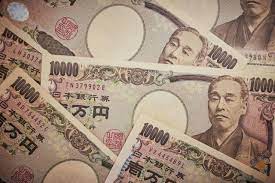
Ahead of a Bank of Japan meeting where interest rates are anticipated to remain low, the yen was parked by a 34-year low on the dollar and decade lows on other crosses, while the dollar dropped elsewhere on softer-than-expected U.S. GDP statistics.
In response to statistics indicating that the U.S. had expanded at its slowest rate in over two years in the first quarter, the euro increased 0.3% overnight to a two-week high of $1.0728. The 1.6% annualised rate fell short of 2.4% economist predictions.
Encouraged by this week's higher-than-expected inflation estimate, the Australian dollar temporarily rose above its 200-day moving average to $0.6539 before falling to $0.6522 in Asian trading on Friday.
However, the yen dropped to 155.75 per dollar, its lowest level since 1990, following a strong increase in U.S. yields and distinct data indicating a spike in an inflation indicator.
That created a 380 basis point difference over Japanese yields at the 10-year tenor, and given that markets are now pricing only 34 basis points of rate cuts in 2024 and U.S. rate cut expectations are dissipating, the gap is likely to remain large.
The magnitude and durability of the yield differential has stimulated short yen positions and pushed Japanese capital into dollar assets like Treasuries, exerting pressure on the currency.
The yen, which was last trading at 155.58 per dollar, has fallen below levels at 152 and 155 to the dollar, where traders had been cautious of pushback or intervention from government.
Shunichi Suzuki, the finance minister of Japan, stated on Friday that he was keeping a careful eye on changes in currency values and was ready to act decisively if necessary. Last week, short yen positions reached their highest level in 17 years.
The Nasdaq dropped two-thirds of a percent, while the S&P 500 fell about half a percent.
The yen hit an almost 16-year low of 167.06 per euro on Thursday, remained there in the morning trade in Asia on Friday, and dropped as low as 101.64 to the Australian dollar, its lowest point in nine and a half years.
After years of negative interest rates, the Bank of Japan already raised rates at a historic meeting in March.
Although the market is not expecting any significant policy changes on Friday, it is closely monitoring any adjustments to inflation forecasts, which might signal a plan to raise interest rates, or any updates to the outlook for interest rates.
Nathan Swami, Citi's Asia-Pacific director of FX trading in Singapore, stated, "The market is not pricing in much from this meeting but it's important to watch where they set official inflation targets, and whether they revise their forecast."
"I'm expecting them to, which then opens up the summer meetings as live."
Overnight, sterling increased by 0.4%, closing at $1.2507. The New Zealand dollar, which has gained over the last four sessions, was slightly stronger in early trade in Asia at $0.5960.
(Source:www.barrons.com)
In response to statistics indicating that the U.S. had expanded at its slowest rate in over two years in the first quarter, the euro increased 0.3% overnight to a two-week high of $1.0728. The 1.6% annualised rate fell short of 2.4% economist predictions.
Encouraged by this week's higher-than-expected inflation estimate, the Australian dollar temporarily rose above its 200-day moving average to $0.6539 before falling to $0.6522 in Asian trading on Friday.
However, the yen dropped to 155.75 per dollar, its lowest level since 1990, following a strong increase in U.S. yields and distinct data indicating a spike in an inflation indicator.
That created a 380 basis point difference over Japanese yields at the 10-year tenor, and given that markets are now pricing only 34 basis points of rate cuts in 2024 and U.S. rate cut expectations are dissipating, the gap is likely to remain large.
The magnitude and durability of the yield differential has stimulated short yen positions and pushed Japanese capital into dollar assets like Treasuries, exerting pressure on the currency.
The yen, which was last trading at 155.58 per dollar, has fallen below levels at 152 and 155 to the dollar, where traders had been cautious of pushback or intervention from government.
Shunichi Suzuki, the finance minister of Japan, stated on Friday that he was keeping a careful eye on changes in currency values and was ready to act decisively if necessary. Last week, short yen positions reached their highest level in 17 years.
The Nasdaq dropped two-thirds of a percent, while the S&P 500 fell about half a percent.
The yen hit an almost 16-year low of 167.06 per euro on Thursday, remained there in the morning trade in Asia on Friday, and dropped as low as 101.64 to the Australian dollar, its lowest point in nine and a half years.
After years of negative interest rates, the Bank of Japan already raised rates at a historic meeting in March.
Although the market is not expecting any significant policy changes on Friday, it is closely monitoring any adjustments to inflation forecasts, which might signal a plan to raise interest rates, or any updates to the outlook for interest rates.
Nathan Swami, Citi's Asia-Pacific director of FX trading in Singapore, stated, "The market is not pricing in much from this meeting but it's important to watch where they set official inflation targets, and whether they revise their forecast."
"I'm expecting them to, which then opens up the summer meetings as live."
Overnight, sterling increased by 0.4%, closing at $1.2507. The New Zealand dollar, which has gained over the last four sessions, was slightly stronger in early trade in Asia at $0.5960.
(Source:www.barrons.com)





